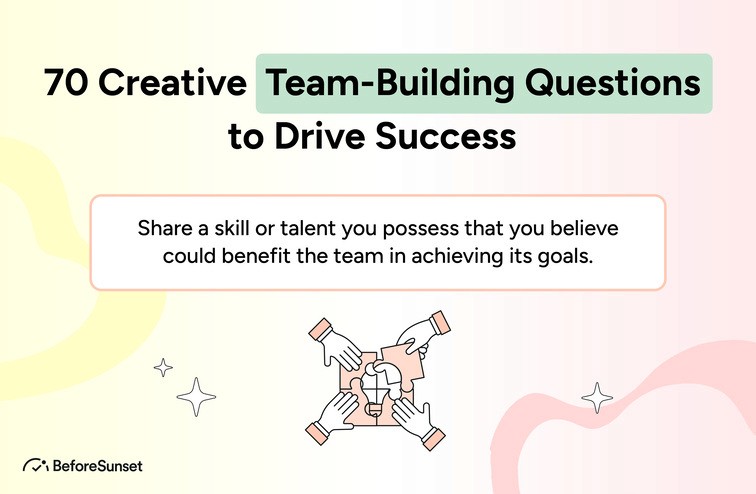We offer a thorough selection of 70 inventive team-building questions to help you maximize the effectiveness of your team-building exercises. These questions are created to encourage creativity and foster camaraderie among your team members.
These questions cross traditional barriers, pushing teams to new levels of accomplishment. They range from thought-provoking difficulties that encourage problem-solving to humorous queries that encourage laughing and togetherness.
Adopt the skill of asking the appropriate questions and watch your team change as they set out on a voyage of discovery, self-discovery, and team development.
These carefully written questions will serve as your compass on the road to a more cohesive and creative team, whether you're a team leader looking to strengthen team ties or a team member ready to contribute to the group's success.

Why You Should Ask Team Building Question?
The need of effective cooperation has grown in importance in the fast-paced and constantly-evolving environment of contemporary organizations. Collaboration, communication, and production may all be improved by creating a cohesive and harmonious team. But in our haste to meet deadlines and hit goals, we frequently forget the most important component of every successful team: the people who make up that team.
As team leaders, supervisors, and coworkers, it is our shared job to foster a culture where team members feel appreciated, understood, and inspired to perform at their highest level. The introduction of team-building questions is a straightforward but very powerful technique that may give any team new vitality, surpassing merely professional affiliations and developing genuine bonds among its members.
A team's individual viewpoints, strengths, and goals can be revealed via the use of team-building exercises. Within the team, there is a wealth of unrealized potential that may be unlocked by asking the proper questions in a secure and encouraging environment. These inquiries have the ability to break through barriers, foster trust, and ignite a sense of camaraderie that beyond the ordinary working relationship.
The benefits of team-building exercises for all teams, regardless of size or sector, will be covered in this guide. We will examine a wide range of question types that can boost team dynamics, from icebreakers that set the stage for meaningful interactions to thought-provoking queries that inspire problem-solving and creativity.
Finding common interests, working together to solve problems, and maximizing the team's collective intellect are all made possible by asking the correct team-building questions. This is more than simply a way to break the ice. This manual will provide you the skills and resources you need to lead successful question-and-answer sessions that will establish trust, respect, and camaraderie among your team members and help them achieve success never before achieved.
This manual is your road map to building a vibrant and cohesive team that lives on collaboration, invention, and collective success, whether you're a team leader hoping to deepen the relationships among your team members or an individual ready to contribute more significantly within the group.
Let's start this path of discovery, comprehension, and development by simply posing team-building questions. Together, we will realize the full potential of our teams, reimagine how we operate, and achieve success in the networked world of today.
Team Building Questions Boost Team Cohesiveness
Cohesion is the basis of an effective and harmonious team in the context of successful teamwork. A team that works well together is more than just a group of people with different skill sets; it is a united force that lives on cooperation and support from one another. Although creating this degree of synergy can seem like a difficult endeavor, a powerful and frequently underutilized tactic is the use of team-building questions.
The use of team-building exercises may maximize your team's dynamics, enable members to interact on a deeper level, and improve overall cohesion. These inquiries have been carefully created in order to spark important discussions, remove obstacles, and promote an atmosphere of open communication and trust.
Participants in team-building question sessions set out on a path of self-discovery and coworker comprehension. These insightful questions reveal the interests, skills, and goals that each team member brings to the group, bridging the gap between personal and professional life.
The secret to team-building questions is their capacity to foster an environment where team members feel free to express themselves, exchange ideas, and pay attention to one another. As a result, a feeling of belonging grows, serving as the cornerstone of cohesion that extends beyond the bounds of regular workdays.
The actual power of team-building questions is shown when they dive into more fundamental issues, beyond the first icebreaker questions that assist team members become acquainted. Team members develop a deep appreciation for one another's distinctive contributions through tackling problems, imagining common objectives, and recognizing each other's talents and flaws.
The advantages of team cohesion go well beyond a friendly workplace. When faced with challenges, a cohesive team exhibits more drive, flexibility, and resilience. They work together smoothly, utilizing many viewpoints to address challenging issues and produce amazing results.

Team Building Questions Help Teams Break Through Relationship and Technology Barriers
The ability of team-building questions to unite teams, break down boundaries, and promote a dynamic mix of interpersonal relationships and technological capability is unmatched. These inquiries promote open communication and foster a climate of trust and compassion, strengthening the relationships between team members. The team also acquires a competitive edge in the current business environment as technology is confidently adopted and fully leveraged.
A team that embraces the transforming power of team-building questions will be better equipped to overcome obstacles and reach previously unimaginable levels of achievement.
The advantages of team cohesion go well beyond a friendly workplace. When faced with challenges, a cohesive team exhibits more drive, flexibility, and resilience. They work together smoothly, utilizing many viewpoints to address challenging issues and produce amazing results.
The History of Workplace Team Building Activities
Workplace team-building exercises have a long history that dates back to the first decades of the 20th century. Over time, changing societal and organizational circumstances have shaped the idea of encouraging cooperation and collaboration among employees. The evolution of team-building exercises at work may be seen in the following timeline:
The Hawthorne Studies in the early 20th century:
The Hawthorne investigations carried out at the Western Electric Hawthorne Works in Chicago between 1924 and 1932 can be related to the history of workplace team development. These studies were started to look at the connection between working environments and productivity. Researchers found that when employees felt appreciated and that they belonged to a strong team, their productivity improved. The significance of social dynamics and collaboration in the workplace was established by this insight.
Post-World War II Era - Outdoor Team-Building Activities:
Outdoor team-building activities became more popular after World War II as businesses began to understand the value of cooperation and group dynamics in attaining common objectives. Ropes courses and wilderness outings are two examples of outdoor team-building exercises that have grown in popularity. These exercises aimed to improve team members' trustworthiness, communication, and problem-solving abilities. Because of the immersive character of these events, workers were able to learn by doing, which strengthened team relationships.
T-Groups and Sensitivity Training in the 1950s and 1960s:
T-groups (training groups) and sensitivity training as team-building techniques first became popular in the 1950s and 1960s. These treatments, which were a component of the larger human relations movement, intended to enhance team members' interpersonal and communication abilities. Participants in T-groups were encouraged to talk about their emotions, ideas, and responses to various events, which gave them new perspectives on how groups function and how people behave.
1980s and 1990s: Management Consultants and Retreats:
Team-building retreats and workshops gained popularity in the 1980s and 1990s thanks to management consultants and corporate trainers. These workshops aimed to enhance participants' leadership, problem-solving, and collaborative skills. Companies started spending money on team-building activities as a way to boost employee morale, boost output, and lessen problems at work.
From the late 20th century to the present - Various Team-Building Methods:
The types of team-building exercises used in the workplace have changed dramatically since the late 20th century and up till the present. Numerous strategies, such as team-building games, simulations, communication drills, workshops, and seminars, have been employed by businesses. Modern team building has also been significantly influenced by technology, with virtual team building exercises becoming more popular as remote work and international cooperation have grown.
Focus on Inclusivity and Well-Being:
In recent years, a greater focus has been placed in team-building exercises on diversity and worker well-being. Companies now understand how crucial it is to foster a welcoming and encouraging workplace. Nowadays, diversity and cultural awareness training are frequently incorporated into team-building events to foster respect and understanding among team members.

Types of Team-Building Questions
This manual is your compass to navigate the world of team-building questions, whether you're a team leader hoping to break the ice and start important dialogues or a team member hoping to establish a welcoming and inclusive work environment.
Together, we will set out on an exploratory adventure where we will learn how thoughtful questioning may help teams become stronger and more cohesive. Let's explore the essential question kinds that give team dynamics life, resulting in enhanced productivity, increased creativity, and a constant sense of camaraderie.
Icebreaker Questions:
What is your favorite travel destination, and why do you love it?
If you could have dinner with any historical figure, who would it be and what would you ask them?
Share a fun fact about yourself that most people wouldn't guess.
What's the most adventurous thing you've ever done?
If you were stranded on a deserted island and could only bring three items, what would they be?
What's your go-to comfort food after a long day?
If you could master any skill instantly, what would it be and why?
What book, movie, or TV show has had the most significant impact on you, and how?
What's one thing you've always wanted to try but haven't had the chance to yet?
Describe your dream weekend getaway and what you'd do during those two days.
Getting to Know You Questions:
What's one hobby or interest that you are really passionate about outside of work?
Share a personal goal you have set for yourself, either in your professional or personal life.
If you could travel back in time and meet your younger self, what advice would you give?
Describe a book or movie that has left a lasting impact on you and why it resonated so strongly.
What is one accomplishment in your life that you are most proud of, and what did you learn from it?
If you could switch places with anyone for a day, who would it be and why?
What's your favorite way to unwind and relax after a busy day?
Share an experience that challenged you but ultimately made you stronger and more resilient.
What is one unique skill or talent you possess that your colleagues might not know about?
Describe a perfect day for you, from morning to night, including your ideal activities and company.
Personal Development Questions:
What is one area of your professional skills or knowledge that you would like to improve, and what steps are you taking to achieve that improvement?
Reflecting on your career journey so far, what have been the most significant lessons you've learned from both successes and challenges?
How do you handle and overcome setbacks or failures in your personal and professional life?
Describe a time when you had to step out of your comfort zone to achieve a goal. What did you learn from that experience?
What are your long-term career goals, and how do you envision achieving them?
How do you prioritize and manage your time to ensure you can balance work, personal life, and self-development effectively?
What are some habits or routines you've implemented to boost your productivity and overall well-being?
Share a book, podcast, or course that has had a profound impact on your personal growth and development.
How do you approach seeking feedback, and how do you use feedback to continuously improve?
Describe a mentor or role model who has positively influenced your personal and professional growth, and what valuable lessons have you learned from them?
Teamwork and Collaboration Questions:
Describe a successful team project you were a part of. What were the key factors that contributed to its success?
How do you typically approach collaborating with team members who have different work styles or perspectives?
Share an experience when you faced a challenge while working in a team. How did the team overcome it, and what did you learn from the process?
In your opinion, what are the essential qualities of a team leader, and how do they impact the team's overall performance?
How do you ensure that everyone's ideas and opinions are heard and valued during team discussions or brainstorming sessions?
When working on a team project, how do you handle conflicts or disagreements that arise between team members?
Describe a time when you had to adapt your communication style to ensure effective collaboration with a diverse group of team members.
How do you promote a sense of trust and psychological safety within your team to encourage open communication and idea-sharing?
Share an example of a time when your team successfully tackled a complex problem. What strategies did you use to approach the problem-solving process?
What steps do you take to ensure that the workload is distributed evenly among team members during a project?
Problem-Solving and Creativity Questions:
If you could solve one major world problem, what would it be, and what steps would you take to address it?
Describe a time when you came up with a creative solution to a challenging problem at work. What was the problem, and how did your solution contribute to the team's success?
Imagine you are presented with a seemingly unsolvable problem at work. How would you approach it, and who in the team would you collaborate with to find a solution?
Share an example of a time when the team successfully innovated or improved a process. How did you foster creativity and collaboration to achieve this?
How do you encourage and support the expression of creative ideas within the team, even if they seem unconventional at first?
When faced with limited resources or tight deadlines, what strategies do you employ to promote creativity and efficient problem-solving?
Describe a time when you had to think "outside the box" to find a solution. What was the outcome, and what did you learn from the experience?
How do you approach brainstorming sessions to ensure all team members actively participate and contribute their ideas?
If you were given unlimited resources and time, what innovative project would you propose to benefit the team or the organization?
How do you handle setbacks or failures when implementing a creative solution, and how do you use them as learning opportunities for future problem-solving?
Strengths and Weaknesses Questions:
Strengths Questions:
What do you consider your greatest strength at work, and how do you leverage it to contribute to the team's success?
Describe an instance where your strengths played a crucial role in achieving a positive outcome for a team project or task.
How do you use your strengths to support and uplift your colleagues and the overall team dynamic?
Share a skill or talent you possess that you believe could benefit the team in achieving its goals.
In what ways do you proactively seek opportunities to apply and develop your strengths in your daily work?
Weaknesses Questions:
What is an area of your professional skills or knowledge that you believe needs improvement, and how do you plan to address it?
Describe a situation where your weaknesses posed a challenge for you or the team. How did you handle it, and what did you learn from the experience?
How do you seek feedback from colleagues to identify areas of improvement, and how do you act upon that feedback?
Share a recent instance when you turned a weakness into a learning opportunity and grew from it.
What steps do you take to ensure that your weaknesses do not hinder the overall progress of the team and its projects?
Fun and Light-Hearted Questions:
If you could switch jobs with any team member for a day, who would it be and why?
What would your superhero name be, and what special powers would you have?
Share a funny or embarrassing work-related story that still makes you laugh.
If you were a character in a sitcom, what kind of humor would you bring to the show?
If you could only eat one food for the rest of your life, what would it be?
What's the most amusing or unique thing that happened to you during a team outing or team-building activity?
If you could bring any fictional character to life, who would it be, and how would they liven up the workplace?
What's your favorite funny movie or TV show, and why does it always make you laugh?
If you could have an unlimited supply of one thing (besides money), what would it be?
Share a joke or pun that never fails to crack you up, no matter how many times you hear it.
Support Your Team By Using BeforeSunset AI
No more drowning in your to-do list. When you don't know where to start or how to start, let AI do the planning for you!


